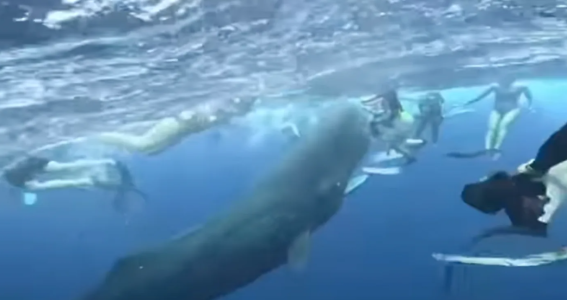Shocking Underwater Snap Triggers Probe: Is This Tourist Trend Harmful Beyond Belief?
By
- Replies 8
The allure of the deep blue sea and its majestic inhabitants has long captivated the human imagination, leading to a burgeoning industry of wildlife tourism. However, a recent incident involving a Chinese tourist has sparked a global conversation about the ethics and impact of such activities on marine life.
The controversy erupted when an underwater photograph surfaced, showing what appeared to be a diver perched on the back of a juvenile whale in the pristine waters of Tonga. The image quickly spread across social media, igniting a firestorm of criticism from locals and conservationists alike, who accused the tourist of disrespecting and potentially harming the gentle giant.
The backlash was swift and severe, with many calling the act 'disgusting' and a blatant violation of the respect owed to these magnificent creatures. Tonga, a Pacific island nation that treasures its humpback whale population, found itself at the centre of this uproar. The country's tourism ministry was compelled to respond, confirming that the individual who posted the image had been tracked to Mauritius, another island grappling with its own issues of wildlife tourism ethics.
In Tonga, swimming with whales is permitted under strict regulations, provided it's done with a licensed operator who ensures the animals are not disturbed or harassed. Yet, the practice remains contentious, especially when it interferes with the whales' migration, breeding, or feeding in the Vava'u island group.
The incident has broader implications, as similar concerns have been raised globally. Mauritius has recently banned swimming with whales on whale watching tours, citing the distressing practice of 'whale chasing' where boats pursue whales to allow tourists to swim with them. Additionally, an Australian research team has highlighted the negative effects of irresponsible behaviour around whale sharks in the Philippines.
The economic stakes are high for Tonga, where humpback whales contribute an estimated US $2.1 million ($3.1m) annually. However, the rapid expansion of the whale watching industry to meet international demand raises serious questions about the sustainability and impact on the whale populations.
In response to the outcry, the Tongan government issued a stern warning, announcing a review of all whale-watching licenses and promising to penalise those who breached regulations. This decisive action underscores the gravity of the situation and the government's commitment to protecting its marine wildlife.
The Chinese tourist group implicated in the controversy has attempted to defend its actions. A woman associated with the group posted an extended video of the dive on WeChat, claiming that the whales approached them voluntarily and could have swum away if they wished. She argued that the moment captured in the photograph was taken out of context by 'haters.'
Despite her defense, the video footage has done little to quell the concerns of conservationists. The China Cetacean Alliance, a whale advocacy group, criticised the vessel for being too close to the pod and questioned the conservation awareness and diving skills of the divers involved.
This incident serves as a stark reminder of the delicate balance between our desire to witness nature's wonders and the need to preserve the very creatures we admire. As we continue to explore the ethical boundaries of wildlife tourism, it's crucial that we prioritize the well-being of these animals over the thrill of a close encounter.
Credit: Instagram
 We at the Seniors Discount Club invite you to reflect on the importance of responsible tourism and the protection of our planet's incredible wildlife. Share your thoughts and experiences with us in the comments below. Have you ever witnessed similar situations on your travels, or do you have ideas on how we can enjoy nature without causing harm? Let's discuss how we can all be better stewards of the natural world.
We at the Seniors Discount Club invite you to reflect on the importance of responsible tourism and the protection of our planet's incredible wildlife. Share your thoughts and experiences with us in the comments below. Have you ever witnessed similar situations on your travels, or do you have ideas on how we can enjoy nature without causing harm? Let's discuss how we can all be better stewards of the natural world.
The controversy erupted when an underwater photograph surfaced, showing what appeared to be a diver perched on the back of a juvenile whale in the pristine waters of Tonga. The image quickly spread across social media, igniting a firestorm of criticism from locals and conservationists alike, who accused the tourist of disrespecting and potentially harming the gentle giant.
The backlash was swift and severe, with many calling the act 'disgusting' and a blatant violation of the respect owed to these magnificent creatures. Tonga, a Pacific island nation that treasures its humpback whale population, found itself at the centre of this uproar. The country's tourism ministry was compelled to respond, confirming that the individual who posted the image had been tracked to Mauritius, another island grappling with its own issues of wildlife tourism ethics.
In Tonga, swimming with whales is permitted under strict regulations, provided it's done with a licensed operator who ensures the animals are not disturbed or harassed. Yet, the practice remains contentious, especially when it interferes with the whales' migration, breeding, or feeding in the Vava'u island group.
The incident has broader implications, as similar concerns have been raised globally. Mauritius has recently banned swimming with whales on whale watching tours, citing the distressing practice of 'whale chasing' where boats pursue whales to allow tourists to swim with them. Additionally, an Australian research team has highlighted the negative effects of irresponsible behaviour around whale sharks in the Philippines.
The economic stakes are high for Tonga, where humpback whales contribute an estimated US $2.1 million ($3.1m) annually. However, the rapid expansion of the whale watching industry to meet international demand raises serious questions about the sustainability and impact on the whale populations.
In response to the outcry, the Tongan government issued a stern warning, announcing a review of all whale-watching licenses and promising to penalise those who breached regulations. This decisive action underscores the gravity of the situation and the government's commitment to protecting its marine wildlife.
The Chinese tourist group implicated in the controversy has attempted to defend its actions. A woman associated with the group posted an extended video of the dive on WeChat, claiming that the whales approached them voluntarily and could have swum away if they wished. She argued that the moment captured in the photograph was taken out of context by 'haters.'
Despite her defense, the video footage has done little to quell the concerns of conservationists. The China Cetacean Alliance, a whale advocacy group, criticised the vessel for being too close to the pod and questioned the conservation awareness and diving skills of the divers involved.
This incident serves as a stark reminder of the delicate balance between our desire to witness nature's wonders and the need to preserve the very creatures we admire. As we continue to explore the ethical boundaries of wildlife tourism, it's crucial that we prioritize the well-being of these animals over the thrill of a close encounter.
Credit: Instagram
Key Takeaways
- An underwater photograph of a Chinese tourist potentially disturbing a juvenile whale sparked outrage and an investigation in Tonga.
- Despite arguments that the image was taken out of context, responses on social media condemned the behaviour as disrespectful to wildlife.
- Tonga's government is reviewing whale-watching licences and has warned of penalties for those breaching regulations amidst concerns about the impact of tourism on whales.
- A video shared by a person associated with the tourist group attempts to defend their actions, claiming the whales approached them and arguing the divers did not harass the animals.








